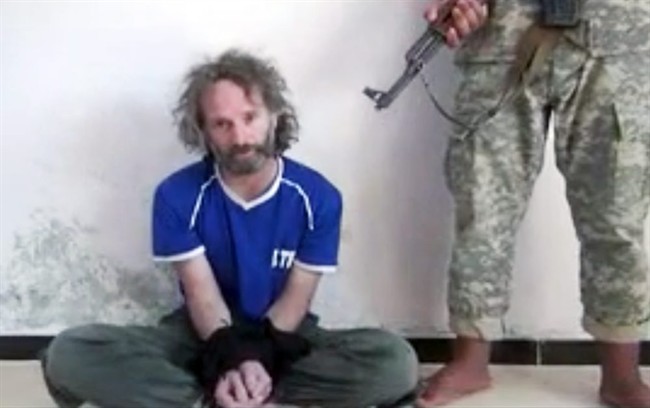Canadians who left home to fight with Islamist militant groups in Syria have been linked to the kidnapping of two U.S. journalists.

Three Canadians who are said to have joined the al-Qaeda affiliate Jabhat al-Nursra, were “directly involved in the holding and harsh interrogation” of Peter Theo Curtis and Matthew Schrier, according to CBC.
Jabhat al-Nusra, also known as the al-Nusra Front, released Curtis on Sunday after 22 months in captivity. Schrier escaped from the extremist group in August 2013, after being held hostage for 210 days.
At the time of his abduction, Curtis was working as a freelance journalist covering the Syrian civil war. He was kidnapped in Turkey, in Oct. 2012, while trying to cross into Syria.
Schrier was covering the war as a freelance journalist, when Jabhat al-Nusra militants captured him.
CBC reported Wednesday, citing unnamed sources, the Canadians involved in Curtis and Shrier’s captivity “reportedly forced the hostages to hand over their computers’ passwords and PINs, drained their accounts” and used their credit cards to buy computers and other electronics online.
The captors also posed as the hostages, writing messages to their families, the sources cited in the report said.
While Curtis has not discussed the identities of his captors, Schrier told the New York Times, in the wake of the Islamic State’s beheading of U.S. freelance journalist James Foley, he suspected his interrogators were Canadian.
READ MORE: Tech insider says firms plan to ‘scrub the web’ of grisly videos
The Canadian government has on several occasions expressed concern about Canadians travelling abroad to take part in terrorism-related activities, in particular those joining groups such as Jabhat al-Nusra and the Islamic State.
The federal government, like those of the United States and United Kingdom, believe radicalized Canadians returning from the Middle East could pose a threat to national security.
In its 2014 Public Report on the Terrorist Threat to Canada, Public Safety Canada announced plans to carry out “targeted early interventions” against young people who “have not yet crossed the threshold into violent activity.”
READ MORE: John Baird pledges $15 million to help with Iraq security
The Canadian government said it is aware of at least 130 Canadian passport holders who are currently involved in “suspected” terrorism-related activities overseas. The CBC report suggests that number is more likely between 200 and 300, while approximately 80 who have returned to Canada for various reasons.
“Some may have engaged in paramilitary activities. Others may have studied in extremist schools, raised money or otherwise supported terrorist groups. Some had their travel interrupted by financial issues, injuries or outside intervention and may plan to travel again. Some extremist travellers never achieved their goals and simply returned to Canada,” the report stated, adding not all extremist travellers pose a direct security threat.
READ MORE: How the feds plan to stop Canadians from joining extremist groups
The federal government also made it a crime for Canadian passport holders who leave or attempt to leave Canada to fight with terrorist groups.
In July, Hasibullah Yusufzai, a 25-year-old man from Burnaby, B.C., became the first person charged under Bill S-7, the Combating Terrorism Act.
Yusufzai reportedly left Canada for Syria in January. He was charged in absentia and will be arrested if he returns to Canada.


Comments